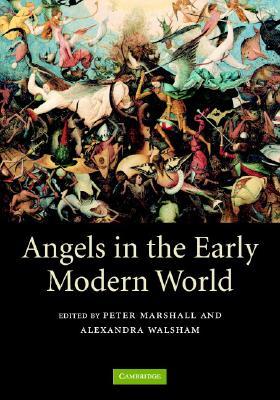- Bible
- Read the Bible
- Bible Versions
- Verse of the Day
- Reading Plans
- Verses by Topic
- Books of the Bible
- Bible Images
- Study
- Commentaries
- Concordances
- Dictionaries
- Encyclopedias
- Sermons
- Bible Atlas & Maps
- BP Wiki
- Devotionals
- Today's Devotionals
- Light of the World
- All Devotionals
- Inspirational Quotes
- More
- Picture Quotes
- Videos
- Inspirational
- Bible Study
- What The Bible Says
- Bible Q&As
- Daily Bread
- Bible by Genre
- Bible Stories
- Random Bible Verse
- Community
- Store
Angels in the Early Modern World
by Peter Marshall
Belief in the importance of angels was as widespread and intense in the early modern era as it had been in the middle ages. This volume is the first to consider how ideas about the nature, existence and activities of angels negotiated the religious, intellectual and cultural upheavals of the sixteenth and seventeenth centuries. The contributors explore the fate and fortunes of these heavenly protectors and messengers against the backdrop of the Renaissance and Reformation and in the context of scientific change. Ranging from the British Isles and continental Europe to New England and Latin America, they consider how angels were implicated in the processes of Protestant and Catholic renewal, their relationship with witchcraft and magic, and their representation in literature and art. Based on original research, the essays offer genuinely fresh insight into the moments and movements that defined the early modern world.
BUY NOW
Hardcover, 342 pages
Published August 1st 2006 by Cambridge University Press
© 2025 Bibleportal.com All rights reserved.

The Reverend Dr. Peter Marshall was a Scottish-American preacher, and twice served as Chaplain of the United States Senate.
Born in Coatbridge (North Lanarkshire), Scotland, Marshall heard a strong calling to the ministry at a young age. Despite having no money, he nevertheless migrated to New York in 1927 when he was 24. He graduated from Columbia Theological Seminary in 1931, when he became the pastor of First Presbyterian Church, a small, rural church in Covington, Georgia. After a brief pastorate, Marshall accepted a call to Atlanta's Westminster Presbyterian Church in 1933. It was in Atlanta that he met his future wife, Catherine Wood, a student at Agnes Scott College whom he married in 1936. Marshall became pastor of the New York Avenue Presbyterian Church in Washington, D.C. in 1937 and was appointed twice as U.S. Senate Chaplain, serving from January 4, 1947 until his sudden death just over two years later. He was 46 years old.
... Show more